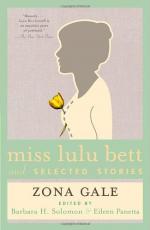II
MAY
Lulu was dusting the parlour. The parlour was rarely used, but every morning it was dusted. By Lulu.
She dusted the black walnut centre table which was of Ina’s choosing, and looked like Ina, shining, complacent, abundantly curved. The leather rocker, too, looked like Ina, brown, plumply upholstered, tipping back a bit. Really, the davenport looked like Ina, for its chintz pattern seemed to bear a design of lifted eyebrows and arch, reproachful eyes.
Lulu dusted the upright piano, and that was like Dwight—in a perpetual attitude of rearing back, with paws out, playful, but capable, too, of roaring a ready bass.
And the black fireplace—there was Mrs. Bett to the life. Colourless, fireless, and with a dust of ashes.
In the midst of all was Lulu herself reflected in the narrow pier glass, bodiless-looking in her blue gingham gown, but somehow alive. Natural.
This pier glass Lulu approached with expectation, not because of herself but because of the photograph on its low marble shelf. A large photograph on a little shelf-easel. A photograph of a man with evident eyes, evident lips, evident cheeks—and each of the six were rounded and convex. You could construct the rest of him. Down there under the glass you could imagine him extending, rounded and convex, with plump hands and curly thumbs and snug clothes. It was Ninian Deacon, Dwight’s brother.
Every day since his coming had been announced Lulu, dusting the parlour, had seen the photograph looking at her with its eyes somehow new. Or were her own eyes new? She dusted this photograph with a difference, lifted, dusted, set it back, less as a process than as an experience. As she dusted the mirror and saw his trim semblance over against her own bodiless reflection, she hurried away. But the eyes of the picture followed her, and she liked it.
She dusted the south window-sill and saw Bobby Larkin come round the house and go to the wood-shed for the lawn mower. She heard the smooth blur of the cutter. Not six times had Bobby traversed the lawn when Lulu saw Di emerge from the house. Di had been caring for her canary and she carried her bird-bath and went to the well, and Lulu divined that Di had deliberately disregarded the handy kitchen taps. Lulu dusted the south window and watched, and in her watching was no quality of spying or of criticism. Nor did she watch wistfully. Rather, she looked out on something in which she had never shared, could not by any chance imagine herself sharing.
The south windows were open. Airs of May bore the soft talking.
“Oh, Bobby, will you pump while I hold this?” And again: “Now wait till I rinse.” And again: “You needn’t be so glum”—the village salutation signifying kindly attention.
Bobby now first spoke: “Who’s glum?” he countered gloomily.




